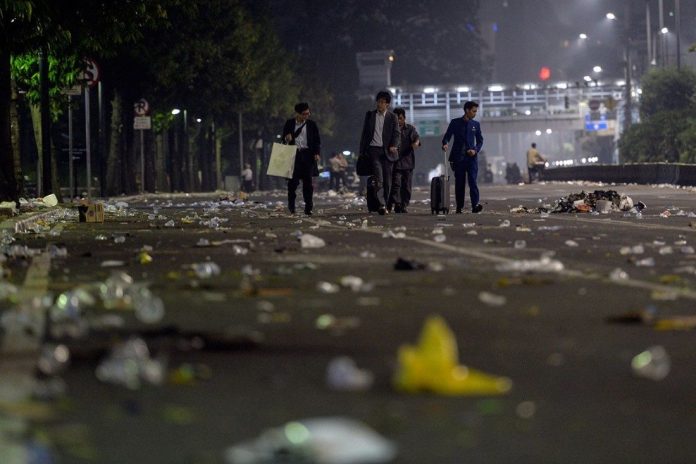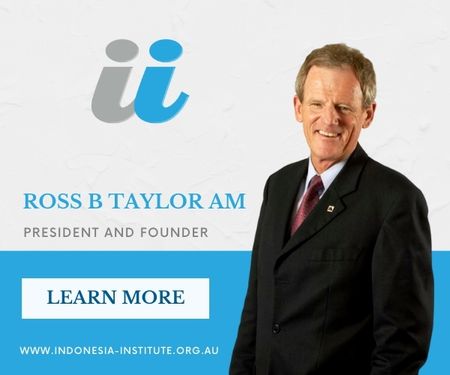“By Dave McRae”
May 24, 2019

The violent protests against the official announcement of Joko “Jokowi” Widodo’s re-election as Indonesian president this week mark the culmination of a months-long campaign by losing candidate Prabowo Subianto to discredit the poll.
As Dirk Tomsa and I wrote in April,(link is external) the Prabowo camp made claims of cheating and manipulation well before election day on 17 April, in the face of public opinion polls that consistently showed them headed for defeat. Calls for “people power” if Prabowo was “cheated” out of victory were a repetitive feature of the last weeks of the campaign. But despite the mayhem caused in Jakarta, this week’s protests seem unlikely to alter what appears to be broad public acceptance of the election result.
Prabowo faced several formidable obstacles in his campaign to convince the public that the presidential election was a fraud. First, the available survey data from reputable pollsters suggests that the Prabowo camp’s claims that the General Elections Commission (KPU) would manipulate the poll did not ring true for most Indonesians. Trust in the KPU and the Elections Oversight Body (Bawaslu) – the target of this week’s protests – remained high ahead of polling day.
Second, it could not have helped that Prabowo’s claims of victory kept shifting. On the evening of the election, Prabowo claimed to have received 55.4 per cent of the vote based on an exit poll and 52.2 per cent based on a quick count(link is external). The following day, this became 62 per cent(link is external) based on a so-called real count. By May, the claim had changed again, to 54.24 per cent(link is external). By contrast, the reputable quick counts provided a consistent picture of the result within hours of polls closing, which was then constantly displayed on TV screens and news websites. These counts have proven to be broadly consistent with the KPU count.
Third, the breadth of the margin – 17 million votes, or approximately 11 per cent, double the 2014 margin of 8.4 million votes – has meant fraud on an immense scale would have been required to manufacture such a result if Prabowo was the genuine winner. The Prabowo camp has failed to produce evidence of such fraud. Two complaints of electoral violations it lodged with Bawaslu were each rejected for lack of evidence, with one said to consist mainly of printouts of online media articles.(link is external) More compelling proof will be required to support its challenge to the result at the Constitutional Court, expected to be lodged today.
Additionally, many people who supported the Prabowo campaign can live with a Jokowi administration, or otherwise blanch at the methods Prabowo is employing to seek victory. To give just one example, Prabowo’s coalition partners the National Mandate Party (PAN) and the Democratic Party have each recognised Jokowi’s victory, amid rumours they will seek to join the government coalition.
Still, the Prabowo camp’s challenge to the result this week has spooked the Jokowi government sufficiently for it to launch an extraordinary response. The blocking of video and image sharing on various social media and messaging platforms is deeply troubling, as is the investigation or arrest of various opposition figures for treason. The government and many of its supporters will maintain these measures are justified by a violent attempt to steal the election result, supported by an aggressive campaign of often ludicrous online hoaxes, such as one suggesting anti-riot police were Chinese officers. But it is sobering to think how such a government response might be interpreted if it were a hypothetical Prabowo government applying the same measures against pro-Jokowi protesters claiming election manipulation.
Those tasked with the design and conduct of Indonesia’s next national elections in 2024 will hope not to face another candidate of Prabowo’s ilk, similarly prepared to attack Indonesia’s electoral institutions. This may well prove to be the case. But the experience of 2019 has nevertheless highlighted several challenges to address before Indonesia next elects its national leaders.
First, the official election result is needed sooner, to head off attempts by the losing candidate to build support for an alternative version of the vote count. Holding the presidential elections on the same day as the much more complex legislative elections this year extended the wait for the official result from 13 days to more than a month.
Second, attacks on nongovernmental bodies seeking to provide impartial verification of results are likely to evolve. This election, quick counts faced concerted attacks on their integrity, and the crowd-sourced public vote count Kawal Pemilu that played such an important role in 2014, complained this time in the first days after the election that it was being flooded with falsified or irrelevant submissions,(link is external)overwhelming its moderators.
Indonesia is fortunate to have a set of survey institutes of high integrity, with a track record of providing accurate quick counts for multiple presidential elections. These institutes responded with agility to claims their counts were falsified, by presenting their data and methodology openly and challenging the Prabowo camp to do the same. One area where greater transparency is needed though is the funding of surveys and quick counts(link is external) – for as long as funding sources remain undisclosed, they are likely to be an avenue of attack.
Third, social media disinformation remains a challenge that the government is yet to solve, and more thinking is required about how to address this challenge in future elections. Disabling core social media functions is unlikely to be a viable solution.
Finally, various observers have also recommended revision or removal of the high nomination threshold for presidential candidates, which has resulted in consecutive head-to-head contests between Jokowi and Prabowo(link is external). The nomination threshold is currently set at 20 per cent of seats in the national legislature or 25 per cent of votes in the preceding legislative election. Intuitively, an opening of the field seems desirable to broaden democratic competition. But as the 2017 Jakarta gubernatorial election showed, three candidate pairs could not guarantee a lessening of disinformation and identity politics.
(Thanks to “Indonesia at Melbourne” Blog, and The University of Melbourne for permission to re-publish this article)





